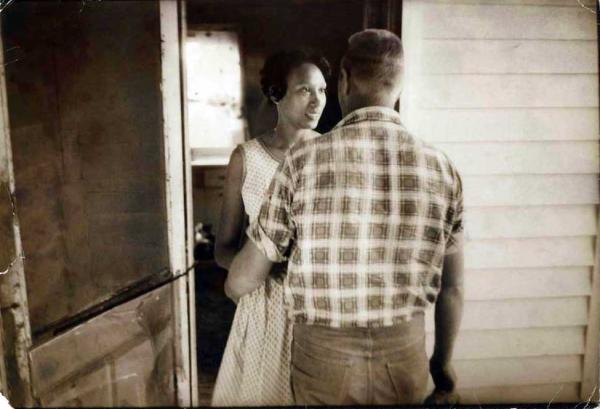The Loving Story and Slavery by Another Name

Photo by Grey Villet, Courtesy of HBO

Photo by Grey Villet, Courtesy of HBO
At 2 a.m. on a July night in 1958, Robert and Mildred Loving were roused from sleep by Caroline County, Virginia police and arrested for the crime of being husband and wife. Mildred was of African-American and Native American descent. Richard, her childhood sweetheart, was white. Their marriage five weeks earlier violated Virginia’s Racial Integrity Act. “That’s no good here,” the sheriff told them, pointing to the framed Washington D.C. marriage certificate that hung above their bed.
Faced with a year in jail or a 25-year banishment from Virginia, the pair fled to D.C. They lived there in exile, away from family, friends, and the Virginia hillside they had both grown up in until, in 1963, a homesick Mildred Loving sought the help of the American Civil Liberties Union in challenging the laws that forced her from her home. The resulting landmark U.S. Supreme Court case, Loving v. Virginia (1967), in which the court found unanimously in the Lovings’ favor, overturned statutes against interracial marriage in 16 states.
This Valentine’s Day a new NEH-funded documentary offers an intimate glimpse of these little known heroes of the civil rights struggle. The Loving Story, which airs February 14th at 9 PM on HBO, tells the story of the Lovings’ marriage and their quiet pursuit of justice through never-before-seen footage taken by cinema verité filmmaker Hope Ryden, LIFE Magazine photos of the couple, and interviews with the Lovings’ friends, attorney, and daughter Peggy Loving. Directed by Nancy Buirski, The Loving Story was produced with support from an NEH grant, and is on the Oscar shortlist for best documentary. View a trailer for the film here.
[Read more about the Lovings and the making of THE LOVING STORY in “The Right to Love” in HUMANITIES magazine.]
Also airing in February, another NEH-funded documentary Slavery by Another Name challenges the notion that slavery in America ended in 1863 with the Emancipation Proclamation. Based on the Pulitzer Prize-winning book of the same name by Douglas A. Blackmon, a Wall Street Journal correspondent, the film recounts how, in the decades between the Civil War and World War II, tens of thousands of African Americans were compelled into forced labor, imprisoned under arbitrary laws designed to intimidate blacks, and sold as cheap labor to coal mines, brickyards, lumber camps, and turpentine farms.
Directed by Sam Pollard (Eyes on the Prize II, The Blues, When the Levees Broke), the 90-minute film tells the story of those who suffered under this new form of slavery, and those who fought against it, through rediscovered letters and legal records and the family stories passed down to descendants of slaves and slave owners. Slavery By Another Name will broadcast on February 13th at 9 PM ET/ 8 PM CT on PBS. The film was supported by an NEH America’s Media Makers Production grant. Watch a preview here.